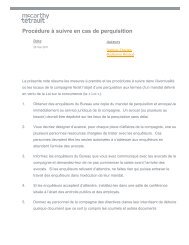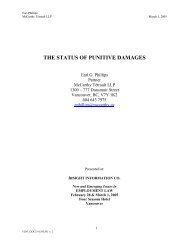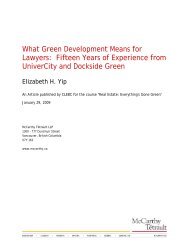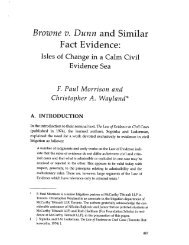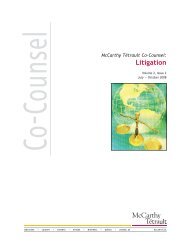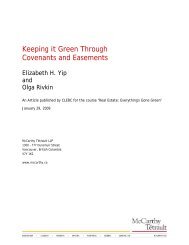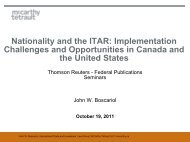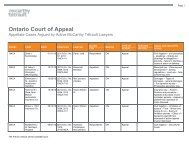The Doctrine of Public Policy in Canadian Contract Law
The Doctrine of Public Policy in Canadian Contract Law
The Doctrine of Public Policy in Canadian Contract Law
You also want an ePaper? Increase the reach of your titles
YUMPU automatically turns print PDFs into web optimized ePapers that Google loves.
8 / Annual Review <strong>of</strong> Civil Litigation<br />
However, despite the fact that the n<strong>in</strong>eteenth century began to witness the<br />
emasculation and dissection <strong>of</strong> public policy <strong>in</strong>to various "heads" and "categories,"<br />
its vigour was affirmed by the House <strong>of</strong> Lords <strong>in</strong> the watershed decision<br />
<strong>of</strong> Egerton v. Earl <strong>of</strong> Brownlow.4° <strong>The</strong>re, the majority <strong>of</strong> the <strong>Law</strong> Lords decl<strong>in</strong>ed<br />
to follow the view expressed by 9 <strong>of</strong> 11 lower judges {who were specially<br />
summoned by the House to provide their op<strong>in</strong>ions <strong>in</strong> this respect) that a condition<br />
<strong>in</strong> a will which made the receipt <strong>of</strong> a large estate conditional upon the<br />
recipient's ability to obta<strong>in</strong> an aristocratic title was not contrary to public policy.<br />
Parke B., one <strong>of</strong> the lower judges, drafted a powerful judgment <strong>in</strong> which he<br />
stated that:<br />
[1]r is the prov<strong>in</strong>ce <strong>of</strong> the statesman, and not the lawyer, to discuss, and <strong>of</strong> the<br />
Legislature to determ<strong>in</strong>e, what is best for the public good, and to provide for it<br />
by proper enactments. It is the prov<strong>in</strong>ce <strong>of</strong> the judge to expound the law only; the<br />
written from the statutes: the unwritten or common law from the decisions <strong>of</strong> our<br />
predecessors and <strong>of</strong> our exist<strong>in</strong>g Courts, from text writers <strong>of</strong> acknowledged<br />
authority, and upon the pr<strong>in</strong>ciples to be clearly deduced from them by sound<br />
reason and just <strong>in</strong>ference; not to speculate upon what is the best, <strong>in</strong> his op<strong>in</strong>ion,<br />
for the advantage <strong>of</strong> the community. Some <strong>of</strong> these decisions may have no doubt<br />
been founded upon the prevail<strong>in</strong>g and just op<strong>in</strong>ions <strong>of</strong> the public good; for<br />
<strong>in</strong>stance, the illegality <strong>of</strong> covenants <strong>in</strong> restra<strong>in</strong>t <strong>of</strong> marriage or trade. <strong>The</strong>y have<br />
become a part <strong>of</strong> the recognised law, and we are therefore bound by them, but we<br />
are not thereby authorised to establish as law everyth<strong>in</strong>g which we may th<strong>in</strong>k for<br />
the public good, and prohibit everyth<strong>in</strong>g which we th<strong>in</strong>k otherwise.4' [emphasis<br />
added]<br />
Nevertheless, <strong>in</strong> accept<strong>in</strong>g the dissent<strong>in</strong>g view, the House sided with Lord<br />
Pollock, C.B., who held the follow<strong>in</strong>g:<br />
bit may be that judges are no better able to discern what is for the public good<br />
than other experienced and enlightened members <strong>of</strong> the community; but that is<br />
no reason for their refus<strong>in</strong>g to enterta<strong>in</strong> the question, and decl<strong>in</strong><strong>in</strong>g to decide<br />
upon it.42 [emphasis added]<br />
Lord Truro, who authored the lead<strong>in</strong>g judgment <strong>in</strong> the House, was <strong>of</strong> the op<strong>in</strong>ion<br />
that public policy served a vital judicial role. He framed his reasons this way:<br />
[i]t has been said that this rule is too uncerta<strong>in</strong> and vague to be capable <strong>of</strong> practical<br />
application by judges, on account <strong>of</strong> the various op<strong>in</strong>ions which may be enterta<strong>in</strong>ed<br />
on the subject <strong>of</strong> public policy. But I th<strong>in</strong>k the remark has no just foundation.<br />
<strong>The</strong>re is no uncerta<strong>in</strong>ty <strong>in</strong> the rule that the law will not uphold dispositions <strong>of</strong><br />
property and contracts which have a tendency prejudicial to the public good.<br />
40 (1853) 4 H.L.C. I [Egerton].<br />
41 Ibid. at 123.<br />
42 Ibid. at 151.



